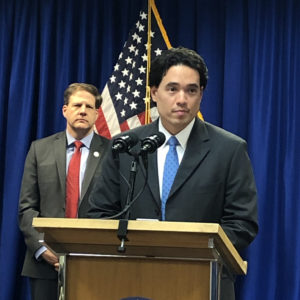Why get the COVID-19 vaccination? Ask the average Granite Stater and they’ll say, “To stop the spread of the virus,” or “To get life back to normal,” or “To be safe.”
But during last week’s COVID press conference the state’s epidemiologist, Dr. Benjaman Chan, threw cold water on all those notions, just as he’d done a week earlier when NHJournal asked him about the COVID-19 vaccines.
Why, we wondered, was Dr. Chan telling people who’ve been fully vaccinated that they must socially distance and continue wearing masks when both basic vaccine science and the available data show vaccines drastically reduce the risk of infection?
“Your characterization of the risk of asymptomatic infection going way, way down is not necessarily supported by the data,” Chan said. “We believe the risk for asymptomatic infection after full vaccination does go down. The data is still emerging on this. These are new studies that have come out in the past several weeks.
“The bottom line,” Chan said, “is we don’t know how much the risk goes down for asymptomatic infection when somebody is fully infected.”
That is not, however, what the head of the Centers for Disease Control and Prevention is saying.
“Our data from the CDC today suggests that vaccinated people do not carry the virus, don’t get sick,” said Dr. Rochelle Walensky, director of the CDC, on Monday. “And that it’s not just in the clinical trials, but it’s also in real-world data.”
In the CDC study of health care and frontline workers, there were no deaths. Just three of 2,479 fully vaccinated people developed a COVID-19 infection. Among the 994 unvaccinated study subjects, 161 were infected.
This study is hardly an outlier. Just four out of 8,121 fully vaccinated employees at the University of Texas Southwestern Medical Center in Dallas tested positive for COVID-19 between December 15, 2020, and January 28, 2021. A study at a Los Angeles health center four just seven out of 14,990 healthcare workers tested positive two or more weeks after being fully vaccinated.
And then there’s the largest ongoing study of which Dr. Chan is very well aware: The entire nation of Israel. A study there found the Pfizer vaccine blocked 94 percent of asymptomatic infections.
It’s true that 94 percent isn’t 100 percent. But it’s about as close as a vaccine is going to get in the real world. And given that COVID-19 is likely to be infecting people for years, if not decades, to come, the risk is never going to be “zero.” If the standard for allowing people to go back to work or attend church without wearing a mask is going to be zero risk, then Granite Staters will be wearing masks forever.
Dr. Chan insists the pressure to wear masks must remain “during this transitionary period,” suggesting that it may have more to do with good social order than science.
In addition to the asymptomatic spread, he also raised fears of non-infectious spread — people who haven’t contracted the virus at all but are still spreading it.
“We don’t really have a lot of good data on the risk that somebody fully vaccinated can still pick up the infection and then spread it to other people. We think the risk is much lower than somebody who’s not vaccinated, but how much is not clear.”
The science behind this claim is less than definitive.
Supporters of Chan’s position argue the science isn’t the point. Keeping masks on is. They note the current spike in cases around the country, even as America hits the 3 million vaccines a day mark.
Once again, the data are problematic. Among the worst-performing states at the moment are New Jersey, New York, and Michigan. They all are experiencing surges in cases, and they all have among the nation’s most stringent mask mandates and COVID-19 restrictions.
Meanwhile, as Newsweek reports: “Coronavirus cases have dropped to a record low in Texas roughly three weeks after the state lifted its mask mandate and reopened businesses.” Georgia and Wyoming also have falling cases and no mask mandate.
The problem with the “a little white lie can’t hurt” approach is that it actually can. Dr. Anthony Fauci is widely believed to have hurt his credibility by falsely claiming during the early days of the pandemic that masks were of little use against the virus. He later acknowledged he was lying in hopes of keeping more PPE available for healthcare workers.
Messages that make it less likely those with “vaccine hesitancy” will take the shot — like “you’ll still be stuck at home alone wearing a mask anyway” — could create their own health risks. About 25 percent of Granite Staters say they are either definitely not or unlikely to get vaccinated. That could become an obstacle on the path toward herd immunity.
Then again, it’s also true the data show resistance to getting vaccinated tends to collapse once the shot becomes widespread. There’s already been a significant decrease in the diehard “no vax” population in the past few weeks, according to polls.
Regardless of the outcome months from now, the data today are clear: Dr. Chan’s current message on vaccinations, masks, and risk does not match the available data.





